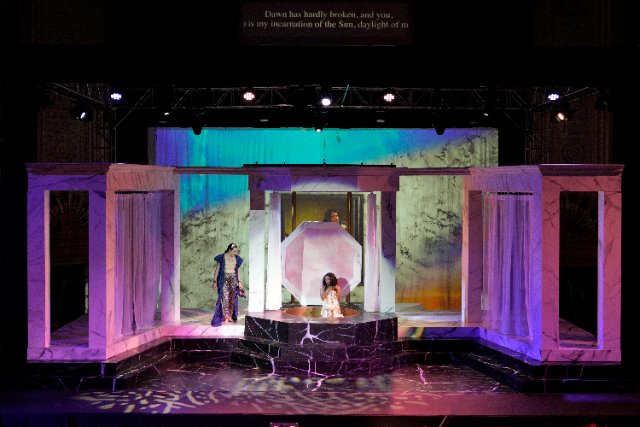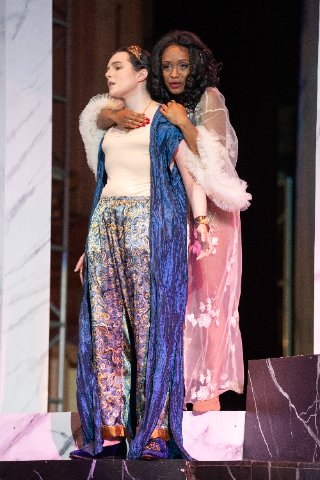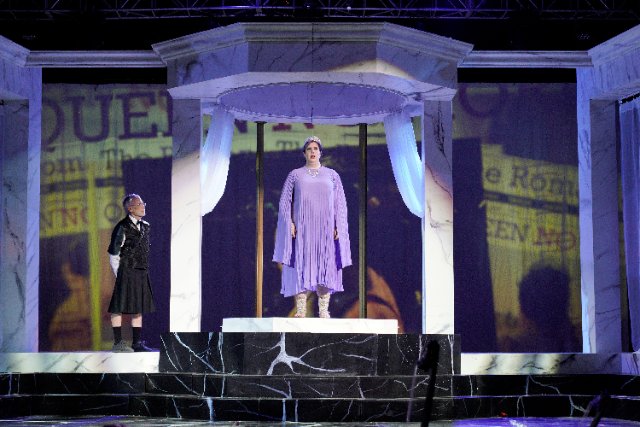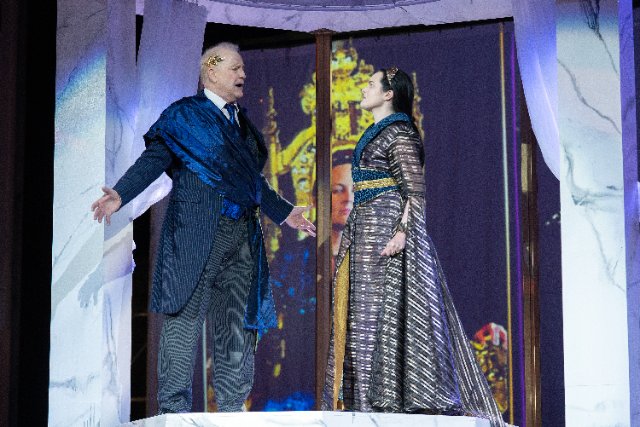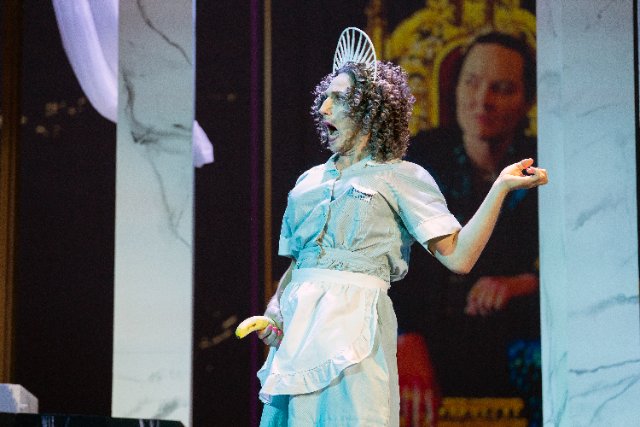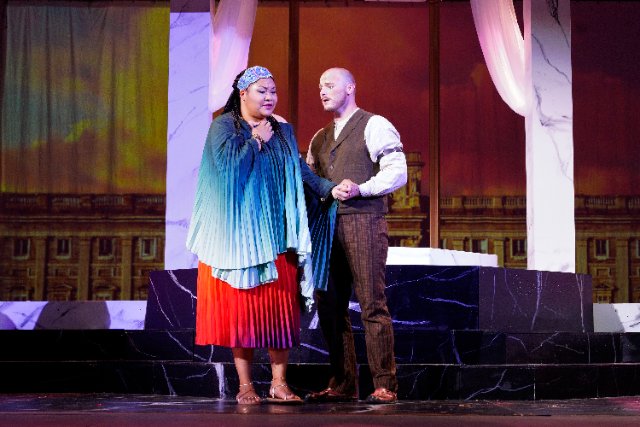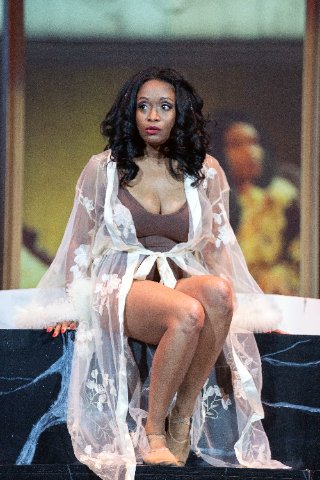The Coronation of Poppea
West Edge Opera Right Sizes a Classic
By: Victor Cordell - Jul 24, 2023
Overwhelmingly, operas based on history are tragic. “The Coronation of Poppea” fits the category but barely meets the standard for adversity, exhibiting only attempted murder, forced suicide, intrigue, betrayal, and banishment.
The work acted as an important bridge between Renaissance and Baroque musical periods. It is one of the earliest extant, and certainly most important seminal operas, produced in 1643 before the word opera was even in use. At that time, music was composed to honor and enhance an existing text, thus Claudio Monteverdi’s music was designed to compliment and complement Giovanni Francesco Busenello’s scenario.
The libretto is historical only in the broadest sense. While the plot points actually occurred from AD 58 to AD 65, not only are they condensed into one day, but their order is shifted! Further, Busenello fancifully changes the character of characters, making some good who were actually bad and vice versa. Who would have thought of the barbaric and narcissistic Nero as also having room for love and magnanimity? So, for those who lambaste Hollywood for being fast and loose with the facts, let it be known that it had models to draw on.
West Edge’s bright and winsome production excels on two most important criteria. The cast amazes – a wonderful match of exciting performers and voices to their respective roles. Also, since copyright is not an issue, the company was able to trim the running time from four hours to a manageable two-and-a-half without loss of plotline or continuity.
Despite the grave nature of many of the incidents, the overall effect of the production is relatively light. This largely derives from ace casting and interpretation decisions, presumably by Artistic Director Adam Pearl. The exacting and honey-tinged coloratura, Shawnette Sulker, heads the cast with a stellar sultry and conniving enactment and voicing of Poppea. While her characterization as Nero’s mistress and wannabe empress is conventional, many others are a delightful confetti of gender bending.
First, as Nero is Sarah Coit, who handles the role’s tricky ornamented passages in the score with great facility. Although written as a trousers role, it would normally be performed in a male mode. However, several physical cues make it appear that a female is performing, and Nero’s wardrobe is largely aligned with that of a woman in terms of patterns and shapes. The most profound gender switch involves Poppea’s nurse, Arnalta, who provides comic relief and is performed by Samuel Faustine. The role calls for an alto, but Faustine sings largely in countertenor. He also possesses a tenor timbre and is able to take deep dives into a lower register to add a special sass and bawdiness to the role. The final gender twist is the part of Ottone, who is Poppea’s lover before she throws him over for Nero. Although Ottone is designed as a trousers role for a mezzo’s voice, in a big surprise, a real male performs the role. This is mellow sounding countertenor Michael Skarke, who acquits himself well.
In order to make Poppea his empress, Nero must rid himself of his wife Octavia. Of course, when she gets drift of Nero’s intentions, Octavia comes up with an assassination scheme that would solve her problem. She is performed by Sara Couden who possesses an uncommonly powerful instrument that absolutely fills a theater. Each time she sang, the audience was rapt in awe.
The adult in the room is Seneca. An advisor to Nero, the great philosopher and dramatist was on the receiving end of advice from Nero to take his own life after being implicated in a plot, perhaps wrongly, to kill the emperor. The dignified and stentorial Philip Skinner fits the role exquisitely, the one exception being that it calls for a bass, while Skinner is a bass-baritone. He does lose volume, but not other qualities at the bottom of the tessitura required.
The music of the opera engages throughout, though in typical Baroque fashion, harpsichords tinkle and theorboes clink with incessant regularity. The score possesses a number of set pieces that are both melodious and meaningful. Two duets are particularly telling and memorable. The first reflects the moral and intellectual distance between Seneca and Nero with the former advising the emperor to be guided by reason and morality in his actions, while the petulant Nero willfully insists that he will have whatever he wants. The other is the closing duet between Nero and Poppea. Erotically charged, it symbolically exudes urgent sexuality in a repeated, fervent call-and-response sequence.
Nina Ball’s set embraces clean lines and function as would be expected for an ancient drama. Yet, the overall staging is gemischt in time and place – although the anachronisms generally enhance rather than detract from the effect. One device shows the events that occur in the action depicted as front-page newspaper articles, dramatically spinning into place on Ryan Yu’s rear-screen projections. Unfortunately, columns and a top beam in the set block the visual and informational effectiveness. Ralph W. Hoy’s costumes are eclectic. Ottone’s and those of supernumeraries earlier in the piece are suggestive of mid-century Ecuador, with Panama hats, panchos, and earthtones. Later, extras are wearing formal kilt attire, which may have simply been available from the venue, Oakland’s Scottish Rite Center.
An area for improvement in future productions relates to supertitles. It would help if characters are identified in the titles at their first utterance. Sometimes, it is simply unclear who a character is until their name is later mentioned, and the viewer may be left at sea for a time. Another observation is that the ambient light reduces the contrast in the supertitles and makes them hard to read for many. Projecting them in larger or thicker font would make them more readable.
Notwithstanding the minor issues, West Edge has produced an opera of historic significance in an intriguing and highly interesting manner.
“The Coronation of Poppea,” (“L’incoronazione di Poppea”) composed by Claudio Monteverdi with libretto by Giovanni Francesco Busenello, is produced by West Edge Opera and plays at Oakland Scottish Rite Center, 1547 Lakeside Drive, Oakland, CA through August 3, 2023.

